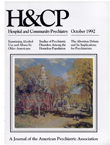Alcoholism in Older Persons: A Review of the Literature
Abstract
Alcohol abuse and dependence in elderly persons is of growing social concern. The most consistent findings of cross-sectional and longitudinal studies are that the quantity and frequency of akohol consumption is higher in elderly men than in elderly uxrnzen, as is the prevalence of alcohol-related probkms. Most studies show a decrease with age in consumption and alcohol-related problems among heavy drinkers. Longitudinal studies show no changes in consumption among light drinkers. Elderly persons with lower incomes consume less alcohol than those with higher incomes. Hosp italized and outpatient populations have more problem drinkers, and the elderly alcoholic is at greater risk for medical and psychiatric comorbidity. About one-third to one-half of elderly alcoholics experience the onset of problem drinking in middle or late life. Outcomes seem to be better for those who have late-onset drinking and may be improved for those treated in same-age rather than mixed-age groups.
Access content
To read the fulltext, please use one of the options below to sign in or purchase access.- Personal login
- Institutional Login
- Sign in via OpenAthens
- Register for access
-
Please login/register if you wish to pair your device and check access availability.
Not a subscriber?
PsychiatryOnline subscription options offer access to the DSM-5 library, books, journals, CME, and patient resources. This all-in-one virtual library provides psychiatrists and mental health professionals with key resources for diagnosis, treatment, research, and professional development.
Need more help? PsychiatryOnline Customer Service may be reached by emailing [email protected] or by calling 800-368-5777 (in the U.S.) or 703-907-7322 (outside the U.S.).



